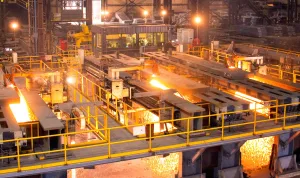How Hong Kong’s Steel Market Drives International Trade: Key Insights for 2024

As a global trading hub, Hong Kong has long been at the center of international commerce, and the steel industry is no exception. The city’s strategic location, excellent port facilities, and close proximity to mainland China make it an essential player in the global steel trade. In 2024, Hong Kong’s steel market continues to have a profound impact on international trade, shaping supply chains and influencing the flow of materials between Asia and the rest of the world.
This article explores how the steel market in Hong Kong affects international trade, focusing on trade dynamics, key players, and market trends that are shaping the future of the industry.
1. Hong Kong as a Gateway to Mainland China
One of the most significant ways Hong Kong’s steel market influences international trade is through its role as a gateway to mainland China. As one of the largest steel producers and consumers in the world, China’s demand for raw materials, including iron ore and scrap steel, creates substantial trade opportunities. Hong Kong serves as a vital transit point for steel products entering and leaving China, facilitating the import of raw materials and the export of finished steel products.
Hong Kong’s free trade policies and sophisticated logistics infrastructure make it an attractive entry point for companies looking to access China’s steel market. The city’s status as a Special Administrative Region allows it to operate under a distinct legal and customs system, enabling streamlined trade processes and making it a crucial link in global steel supply chains.
2. Steel Imports and Re-Exports: Connecting Global Markets
Hong Kong’s steel market is heavily dependent on imports, with much of the city’s steel being sourced from regional and global markets. Japan, South Korea, and Taiwan are among the primary suppliers of high-quality steel products to Hong Kong. Once imported, these materials are either used domestically for construction and manufacturing or re-exported to other countries, especially in Southeast Asia and the Greater Bay Area.
The re-export of steel from Hong Kong contributes significantly to international trade, allowing businesses to leverage the city’s extensive network of shipping routes and trade agreements. Hong Kong’s proximity to key Asian markets gives it a strategic advantage in facilitating the flow of steel products across borders, reinforcing its role as a critical node in global trade.
3. The Influence of Trade Policies and Tariffs
International trade in steel is subject to various trade policies, tariffs, and regulations that can directly impact Hong Kong’s steel market. In recent years, global trade tensions, particularly between the U.S. and China, have introduced uncertainties into the steel trade. Tariffs imposed on steel products by major economies can affect both the price and supply of steel entering and leaving Hong Kong.
As a result, Hong Kong steel traders must navigate complex international regulations and adapt to fluctuating market conditions. However, Hong Kong’s flexible trade environment, supported by free trade agreements (FTAs) and its status as a member of the World Trade Organization (WTO), enables the city to mitigate some of the challenges posed by global trade barriers.
4. The Role of Hong Kong in the Greater Bay Area Initiative
Hong Kong’s steel market is also closely tied to the Greater Bay Area (GBA) initiative, which seeks to create an integrated economic hub encompassing Hong Kong, Macau, and nine cities in Guangdong province. The GBA represents a significant opportunity for steel manufacturers and traders, as infrastructure projects and urban development in the region drive demand for steel.
Hong Kong’s expertise in international trade, finance, and logistics allows it to play a pivotal role in facilitating the movement of steel within the GBA. The city acts as a conduit for steel products flowing between the region’s rapidly expanding cities and international markets, further boosting its influence in the global steel trade.
5. Hong Kong’s Role in Global Supply Chains
As international steel supply chains become more interconnected, Hong Kong’s role in coordinating logistics and distribution is increasingly vital. The city’s deep-water ports, advanced shipping infrastructure, and extensive air cargo facilities make it a key hub for steel products moving between Asia, Europe, and the Americas.
Hong Kong’s efficiency in managing the import and export of steel products helps reduce lead times, minimize costs, and enhance supply chain resilience. The city’s expertise in customs clearance, warehousing, and distribution supports smooth global trade operations, benefiting steel manufacturers and distributors across the world.
6. Sustainability and Innovation in Steel Trade
Sustainability is becoming an increasingly important factor in international trade, and Hong Kong’s steel market is no exception. The global push toward reducing carbon emissions and adopting greener manufacturing practices is reshaping the steel industry. As environmental regulations tighten, steel producers are investing in innovative technologies to lower emissions and improve energy efficiency.
Hong Kong’s steel traders and manufacturers are aligning with these global trends, offering sustainable steel products to meet the growing demand for eco-friendly materials. This shift toward sustainability not only improves the competitiveness of Hong Kong’s steel market but also opens up new trade opportunities with environmentally conscious markets around the world.
Conclusion:
Hong Kong’s steel market is a key driver of international trade, acting as a vital link between global suppliers and buyers. Its strategic location, free trade policies, and robust infrastructure make it a crucial hub for the flow of steel products. As the world continues to navigate trade uncertainties and sustainability challenges, Hong Kong’s ability to adapt and innovate will ensure its ongoing significance in the global steel market.
Whether through facilitating trade with mainland China, serving as a re-export hub, or supporting the Greater Bay Area’s infrastructure growth, Hong Kong’s steel market will remain a cornerstone of international trade in 2024 and beyond.



